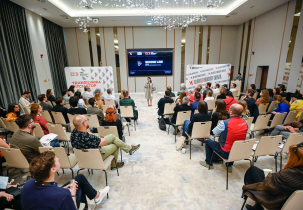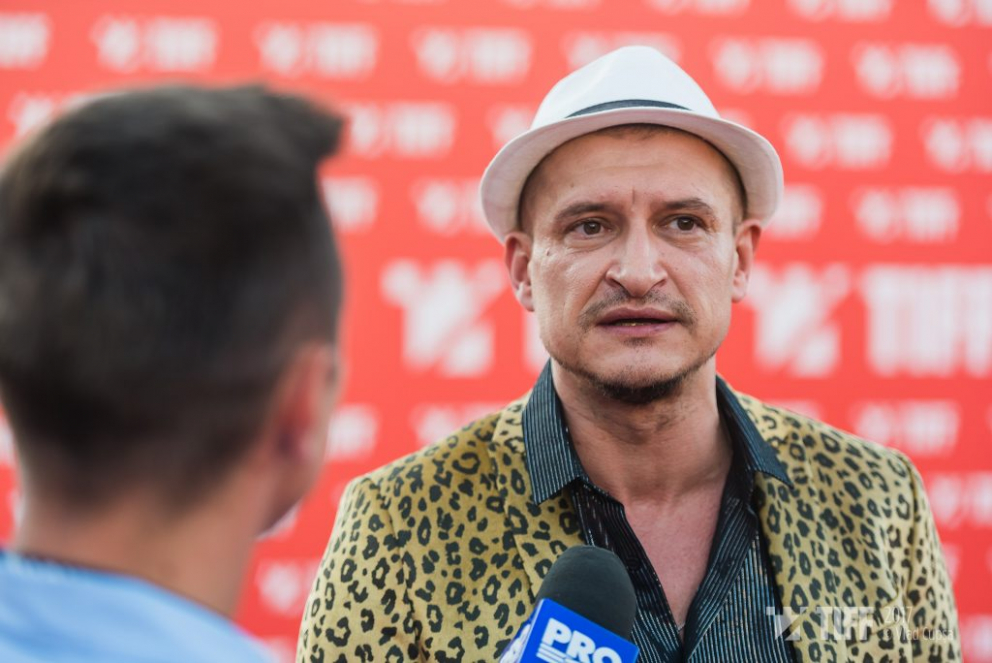
Mihai Chirilov, the Festival's artistic director, has put together a gourmet cinematic menu for AperiTIFF, combining everything from super-stylised documentaries and hybrid productions to anti-system films, horror cine-concerts and exhibitions.
This year's image campaign is closely linked to the war in Ukraine. How much is this also reflected in the festival selection? Are there any key films on the subject?
The image campaign was self-evident given the context, but it has to be said that it was not an easy journey. At the beginning there was the idea of a parody of Don't Look Up!, with an asteroid hitting Unirii Square on the opening day of TIFF. It was in the spirit of our previous spots, but in early March we realized that the satirical tone in a catastrophic key might seem out of place. And so, we came up with the manifesto slogan on this year's poster, Make films, not war!, and what we thought would be the most appropriate cinematic representation: the burlesque gunfight sequence in Pintilie's film Balanța (The Oak), brutally mirrored at the end of the film by the real-life massacre of innocents in the bus scene. In other words, TIFF takes a clear stand against war, but also against fuelling and sustaining conflict in our immediate vicinity.
This is not to say, by some false logic, that films about war have no place at TIFF. In art you don't operate with such easy automatisms. The perpetuated conflict in the region for years is reflected in the Ukrainian film Miraj (Reflection) by Valentyn Vasyanovych (previously at TIFF with Atlantis), a shocking testimony to the dehumanizing practices of wartime, its devastating effects, alienation and the difficulty of readjusting to normality. There are two other Ukrainian films in the programme, Rhino and Pamfir, which are not explicitly about war, but about violence and wrong life decisions. We also have two dynamite Russian films in the line-up, Căpitanul Volkonogov a scăpat (Captain Volkonogov Escaped) and Execuția (The Execution), because it seems to us that film festivals should not themselves become battlefields, turning Russian productions into collateral casualties of war, especially as we are talking about anti-system films here. We think it's important for both voices to exist, we believe in the freedom of expression, that's the essence of the pacifist message in the poster.
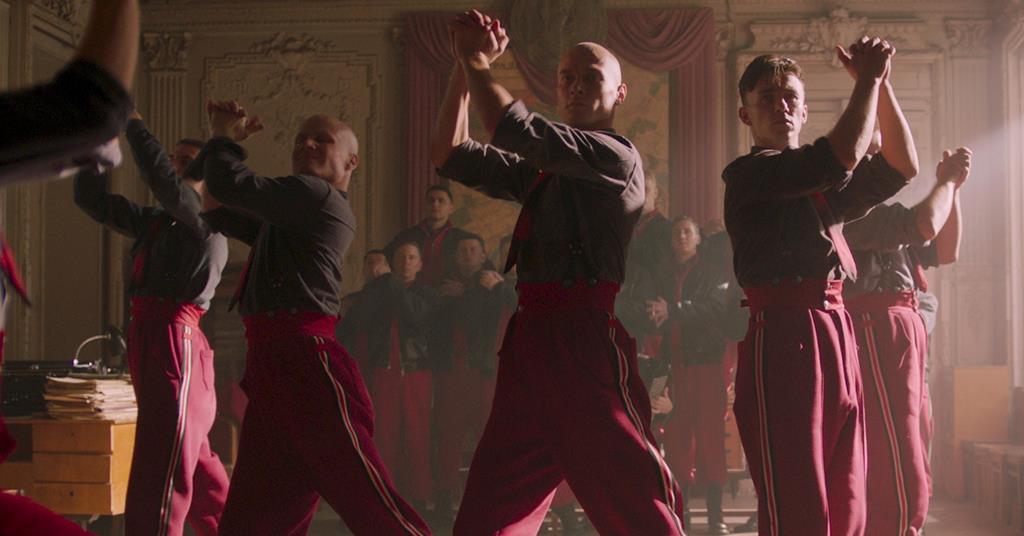
Căpitanul Volkonogov a scăpat/ Captain Volkonogov escaped
Boycotting without nuance and discernment is at least as reprehensible as war being waged, and cultural forums should not function as instruments of execution and repression as political courts do.
It's also the first edition of TIFF without restrictions: are there any of the changes the Festival has had to adapt to in the past years?
Fortunately, the more or less justified restrictions have disappeared from the picture. Out of the two pandemic years, which involved an almost complete reconfiguration of the Festival so that it could take place in a physical format, we kept those new outdoor screening venues that are not only very classy (like the inner courtyard of the UBB or the Polygon Park in Florești), but also proved to be very effective in attracting an instant film-going audience.
What convinced you that the films in the competition deserve to run for the Transylvania Trophy? What did these films have that other didn't?
They convinced not only me, but also my colleagues on the selection committee. It's a picture that becomes coloured as you go along, seeing dozens, hundreds of films that gradually become pieces of a jigsaw whose final picture you don't know beforehand. Every year, this is a challenge and a difficult task in putting the competition together, to find those irregular narrative and stylistic geometries that, put together, add up to an unpredictable but unified whole.
After two years that have turned things upside down, people are more confused and divided than ever, the world is slowly breaking down under the pressure of a hypothetical new beginning, the old and the new are in open conflict, societal norms are being reconfigured on the fly, riots, rebellion and violence are the order of the day, the desire for human connection is heightened, and the notion of freedom is increasingly diffuse and questioned. Although the films in this year's competition do not explicitly speak to the troubled times we have lived through and seem to continue to live through, it is almost impossible not to read them in the light of all these feelings and effects that have been visited upon us. Not just us, but most of the characters in the 12 films in the competition have the ground slipping out from under their feet, seriously, and sometimes decisively and tragically, threatening the need for balance.
How did the idea of turning the What's Up, Doc? section into a competitive one? Are there any non-fiction titles not to be missed?
On the eve of the festival's third decade, we felt it was time to introduce a new competition to the programme and that documentaries deserved the honours. We narrowed it down to first and second-time filmmakers only (just like the fiction competition), only we didn't know exactly what kind of documentary we were looking for and were not sure where we were going. At the end of the selection process, the profile of the section almost imposed itself as we discovered more and more super-stylised documentaries and hybrid productions that boldly stray from the conventions of the genre, exploring its limits but also its transgressions. The mutations are obvious, assumed, terribly playful and stimulating.
The new-age documentary flirts more and more with fiction, knowingly breaks the rules and even indulges in the luxury of blasphemy and conspiracy. At the risk of upsetting purists, almost anything goes in What's Up, Doc?, including those films that blur the line between fiction and documentary to the point where the labels become inoperable and you no longer know exactly what you're looking at, what's real and what's not, and why. After all, that's pretty much the way it is in the world we live in today, since yesterday's conspiracy theories turn out to be tomorrow's reality, and truths titled in block letters are almost immediately debunked as fake news. There are 10 films in this competition and each, in its own unique way, is not to be missed. But to better understand the stakes and concept of this programme, I particularly recommend Atlantida (Atlantis) (dir. Yuri Ancarani, the last ten minutes border on genius), Câmpiile (The Plains) (dir. David Easteal), Pentru mine tu ești Ceaușescu (For Me You Are Ceaușescu) (dir. Sebastian Mihăilescu) and Ce-i prea mult strică (What's Too Much Sucks) (dir. Morgane Dziurla-Petit).
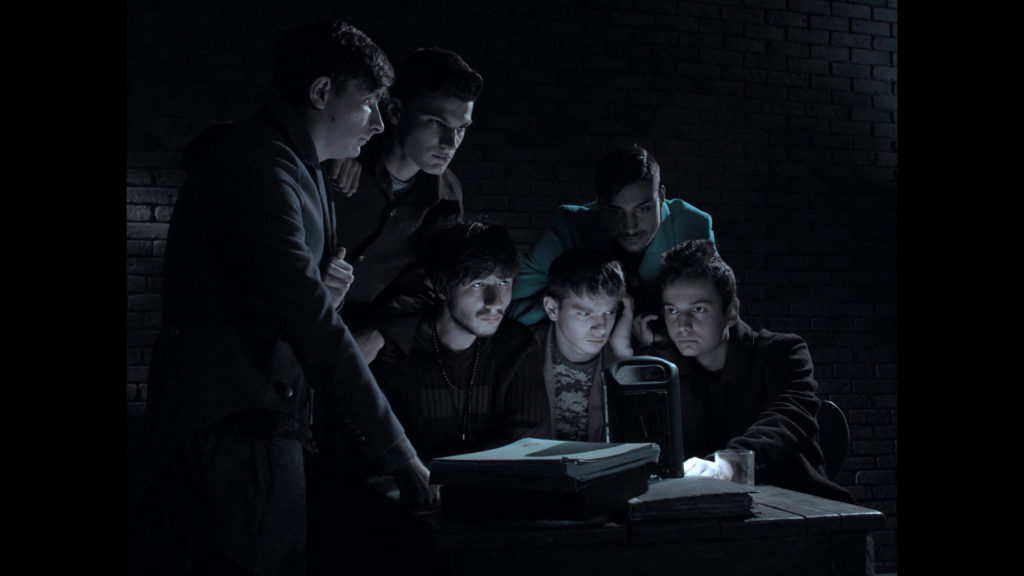
Pentru mine tu ești Ceaușescu
Why the focus on Poland and Israel now? How did the spark ignite?
National spotlights are usually the result of a happy coincidence of circumstances. On the one hand, the extremely high level of recent productions of the countries chosen, and on the other, the possibility of institutional partnerships designed to make the most of these programmes, with large delegations of artists and related events designed as veritable portals into the culture of the countries concerned. In addition, the Kieslowski retrospective and our long-standing complicity with the Wroclaw and Warsaw festivals led us to choose Poland as the guest country for this edition, with more than 20 titles in view, including series (Klangor) and short films, cine-concerts (not to be missed the silent film Bestia (The Beast) with Pola Negri and the soundtrack by Grammy award-winning musician Włodek Pawlik), cult films (Croaziera (The Cruise) for example, the unofficial relative of the film of the same name directed by Mircea Daneliuc), but also extremely recent films, of which I recommend Nu lăsa urme (Don't Leave Traces) (dir. Jan P. Matuszynski, a detonating denunciation of police brutality and authoritarian regimes, inspired by a heart-breaking real-life case), and one of the personal surprises of the edition, the documentary Filmul din balcon (Film from the Balcony) (dir. Paweł Łoziński).
The other guest country, Israel, comes with a balanced mix of fiction and documentary, as well as a series in the What's Next section (Fete triste de oraș / Sad City Girls) and a presence in the popular Film Food programme, which involves a screening of a food-themed film (Pâinea noastră / Our Bread) followed by a special dinner cooked by a pedigree chef. Not to be missed are the uber-talented Nadav Lapid's new film, Genunchiul lui Ahed (Ahed's Knee), and the documentaries Orchestra cu instrumente stricate (Broken Instrument Orchestra) (a unique musical experiment directed by Yuval Hameiri) and the controversial Șase milioane (Six Million) (dir. David Fisher), a ticking time bomb thanks to a razor-sharp investigation of a taboo subject.
What does this year's ZFR selection look like? It's a short period, but has the local landscape changed at all since last year, when there were a record number of Romanian films premiering at TIFF?
Obviously, there are fewer films than last year, when the pandemic that began in 2020 created a traffic jam of titles that exploded in the 2021 programme. Curiously, we have very few documentaries in the selection (which is why, in previous editions, we anticipated a revival of the genre, in the collective's wake) - namely a recent one (Pentru mine tu ești Ceaușescu / For Me You Are Ceaușescu, though also a hybrid:) and the anthology titles in the retrospective dedicated to Alecu Solomon (who is also a juror for the What's Up, Doc? section).
There are, however, a record number of debuts (no less than 8 of the 13 local films on the programme), with Alex Belc's Metronom (Metronome) as the headliner (congratulations on his Cannes award for directing!) and the female trio of Alina Grigore - Monica Stan - Ligia Ciornei (Crai nou (Blue Moon), Imaculat (Immaculate) and Anul pierdut 1986 (Clouds of Chernobyl). Special mentions for the two Romanian titles also in the international competition, Marocco by Emanuel Pârvu (on an impeccable script evoking the moral meanderings of the Iranian feature A Separation) and Balaur (A Higher Law) by Octav Chelaru (a playful and unexpected mix of Notes on a Scandal and Fatal Attraction). Last but not least, Florin Piersic jr.'s sex and cynicism bomb, Nimic despre dragoste ([Nothing] about Love), which pours sulphuric acid over the deceptive appearances of married life.
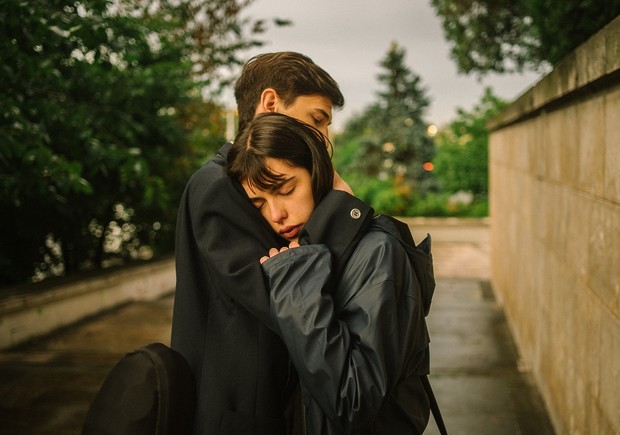
Metronom
Which of the Festival's events are you most looking forward to?
The Nosferatu cinematic concert at Bonțida, celebrating the centenary of Murnau's horror masterpiece - with an original soundtrack composed for the big orchestra by the mega-talented Simona Strungaru. The Sleeping Beauties photo exhibition at the Museum of Art by Cristian Lipovan, who I discovered on Instagram thanks to a share by Anca Grădinariu. The last take from the last film on the last day of the festival - whatever the film, for me it's a source of pure emotion!
What titles shouldn't we miss at TIFF.21?
Make that 21, I say, in random order: Irreversible – Straight Cut, re-edited in 2019 by Gaspar Noé; last Saturday's surprise film (hint: it was at Cannes and belongs to a former Transylvania Trophy winner); Atlantida (Atlantis) (I know, I'm repeating myself); Căpitanul Volkonogov a scăpat (Captain Volkonogov Escaped) (I'm repeating myself again); Orbul care n-a vrut să vadă Titanic (The Blind Man Who Did Not Want to See Titanic) (melodrama, thriller, dark humour and a wheelchair-bound protagonist); Orice, oriunde, oricând (Everything Everywhere All at Once) (indie extravaganza of the year and the most wow plot); Fuga din Mogadishu (Escape from Mogadishu) (superlative Korean action); the adaptation of Balzac's Lost Illusions; the tour de force with no editing cuts in Sub presiune (Under Pressure); the boundless passion of the couple in Iubire vulcanică (Volcanic Love); the Berlin Golden Bear winner Alcarràs; the cinematic concert Moonwalk One (not about Michael, but about the moon landing); the Leonard Cohen documentary Hallelujah (not a mega fan, but it grew on me without notice); the dialogue irreverence of the low-budget Spanish comedy Clubul șomerilor (The Unemployed Club) (hands up those who still remember Aislados! ), fresh from Cannes Cut! and Godland; the narrative electroshocks of Marea libertate (Great Freedom); the blunt confessions of Chilean Matias Bize's Private Messages; the discourse of the Ceausescu's hologram in Nicolae ( dir. Mihai Grecu); the mix of vintage footage and puppet animation from the 70s; and Kieslowski's short Talking Heads, screened in loop at the Art Museum.
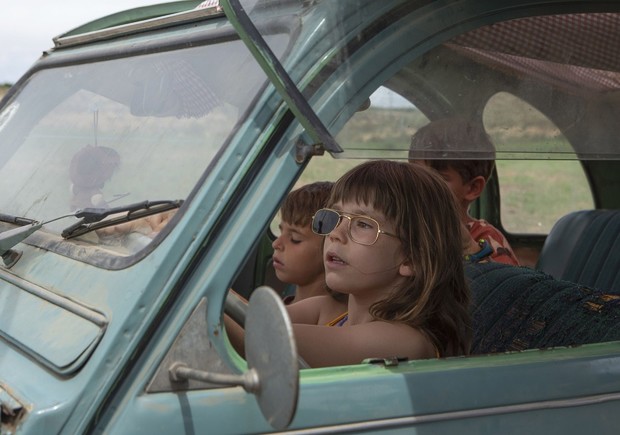
Alcarras
Three wishes for this first somewhat post-pandemic TIFF?
No rain at the opening. That I don't miss the closing party, as happened to me last year when I got to the hotel to change and fell asleep with my clothes on only to wake up at 6. To be on time for the traditional Hungarian Day goulash party, so I don't lick the empty pot again.




